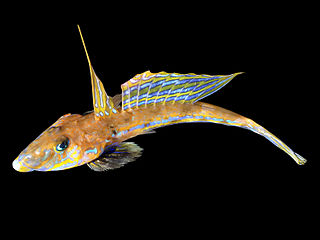
The cutlassfishes are about 45 species of predatory ray-finned fish in the family Trichiuridae of the order Scombriformes found in seas throughout the world. Fish of this family are long, slender, and generally steely blue or silver in colour, giving rise to their name. They have reduced or absent pelvic and caudal fins, giving them an eel-like appearance, and large fang-like teeth.

Ophichthidae is a family of fish in the order Anguilliformes, commonly known as the snake eels. The term "Ophichthidae" comes from Greek ophis ("serpent") and ichthys ("fish"). Snake eels are also burrowing eels. They are named for their physical appearance, as they have long, cylindrical, snake-like bodies. This family is found worldwide in tropical to warm temperate waters. They inhabit a wide range of habitats, from coastal shallows and even rivers, to depths below 800 m (2,600 ft). Most species are bottom dwellers, hiding in mud or sand to capture their prey of crustaceans and small fish, but some are pelagic.

Pteroidichthys is a genus of marine ray-finned fish belonging to the family Scorpaenidae, the scorpionfishes. The scorpionfishes in this genus are distributed in the Indian and Pacific Oceans.

Sillago is a genus of fish in the family Sillaginidae and the only non-monotypic genus in the family. Distinguishing the species can be difficult, with many similar in appearance and colour, forcing the use of swim bladder morphology as a definitive feature. All species are benthic in nature and generally coastal fish, living in shallow, protected waters although there are exceptions. Minor fisheries exist around various species of Sillago, making them of minor importance in most of their range. This genus has the widest distribution of any smelt-whiting genus, spanning much of the Indo-Pacific. The genus ranges from the east coast of Africa to Japan in the east and Southern Australia in the south, with most species concentrated around South East Asia, the Indonesian Archipelago and Australia. Many species have overlapping distribution, often making positive identification hard.

Pteroidichthys amboinensis, the Ambon scorpionfish or Godfrey's scorpionfish, is a species of marine ray-finned fish belonging to the family Scorpaenidae, the scorpionfishes. It is found in the Indian and Pacific oceans.

Callionymus is a genus of dragonets found mostly in the Indian and Pacific oceans with a few species occurring in the Atlantic Ocean.

Caesionidae, the fusiliers, are a family of marine ray-finned fishes in the order Perciformes. The family includes about 23 species. They are related to the snappers, but adapted for feeding on plankton, rather than on larger prey. They are found at reefs in the Indo-Pacific and in the Red Sea.

Cynoglossus is a genus of fish in the family Cynoglossidae. Most species are indigenous to the Indo-Pacific region, but there are also a few in warmer parts of the East Atlantic. They are commonly found in shallow waters on a muddy or sandy bottom, including estuaries and a few species are restricted to fresh water. One species Cynoglossus sinusarabici has invaded the Mediterranean Sea through the Suez Canal from the Red Sea, a process known as Lessepsian or Erythrean migration.
Mixomyrophis is a genus of eel in the family Ophichthidae. It is known only from the Atlantic Ocean and Red Sea in the vicinity of Anguilla and Israel.

Dysomma is a genus of marine ray-finned fishes belonging to the family Synaphobranchidae, the cutthroat eels. These eels are found in the Atlantic, Indian and Pacific Oceans.

Diplodus is a genus of marine ray-finned fish belonging the family Sparidae, which includes the seabreams and porgies. These fishes are found in the Atlantic Ocean, the Mediterranean Sea and the western Indian Ocean.

The scaldfishes comprise a genus, Arnoglossus, of lefteye flounders. They are found in the Pacific, Indian and Atlantic Oceans, including the Mediterranean and Black Sea. They are entirely absent from most of the Americas; the only exceptions are A. coeruleosticta and A. multirastris found off Chile. The genus include both species found in shallow and deeper water. The largest species reaches 28 cm (11 in).

Ostichthys is a genus of fish in the family Holocentridae found in Atlantic, Indian and Pacific Ocean.

Acropoma is a genus of ray-finned fish in the family Acropomatidae, the temperate ocean-basses or lanternbellies. They are native to the Indian Ocean and western Pacific Ocean. They are characterized by a ventral luminous organ that has a luminous gland, a lens, and a reflector. The shape of the luminous organ helps distinguish the species in the genus.

The mottled fusilier is a species of marine ray-finned fish, a fusilier belonging to the family Lutjanidae. It has a broad Indo-Pacific distribution. Once thought to be a monotypic genus, until a second species Dipterygonotus marisrubri was transferred in 2024.

Limnichthys is a genus of sandburrowers native to the Indian and Pacific oceans.

Pleurosicya is a genus of gobies native to reef environments of the Indian Ocean and the western Pacific Ocean.

Evoxymetopon is a genus of cutlassfish found in all oceans. It is one of nine genera in the family Trichiuridae.
Suculentophichthus nasus also known as the Red Sea flappy snake eel is a species of ophichthid fish found in Israel. This species occurs Eilat in Gulf of Aqaba, Red Sea, Israel. This species is the only known member of the genus Suculentophichthus.
Dipterygonotus marisrubri is a species of marine ray-finned fish, first described in 2014. It is endemic to the waters of the Red Sea. This species can reach a standard length of 7.4 cm (2.9 in). Until 2024, it was classified as Emmelichthys marisrubri until a phylogenetic analysis suggested a transfer.















